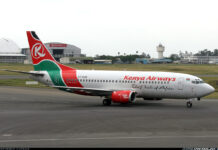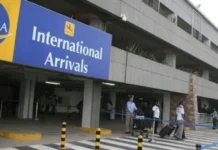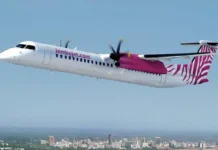(Reuters) – Delta Air Lines (DAL.N), opens new tab delivered an upbeat outlook for the current quarter on Thursday, after posting stronger-than-expected third-quarter earnings, buoyed by a recovery in corporate travel demand and improved pricing power.
The Atlanta-based airline said its sales have accelerated over the past six weeks across all geographies, and also reported a rebound in corporate bookings with improvement across all sectors.
Delta’s shares rose more than 5% in early trading. Shares of United Airlines (UAL.O), opens new tab, American Airlines (AAL.O), opens new tab, JetBlue (JBLU.O), opens new tab and Alaska Air (ALK.N), opens new tab also gained between 2% and 5%.
A sharp reduction in airline seat capacity in the domestic market has driven up ticket prices. This contributed to Delta’s higher unit revenue, a key indicator for pricing power, in the September quarter, following a decline in the previous quarter.
With bankrupt Spirit Airlines shrinking its operations and most carriers moderating their growth plans to prevent discounting pressure, Delta expects its unit revenue to remain positive in the December quarter.
Third Bridge analyst Peter McNally said he expects Delta’s revenue growth to extend into 2026 and sees the carrier and peer United benefiting from their premium offerings.
The airline expects an adjusted profit in the range of $1.60 to $1.90 a share for the quarter through December. The midpoint of the forecast is $1.75, compared with analysts’ average estimate of $1.66, according to data compiled by LSEG. Delta’s quarterly revenue is projected to rise about 2% to 4% from year-ago levels.
It reported an adjusted profit of $1.71 a share in the September quarter, compared with analysts’ average estimate of $1.53 per share.
CEO Ed Bastian said Delta is also “well-positioned” to deliver revenue growth as well as margin expansion next year.
The airline’s bullish tone contrasts with a rocky first half of the year when economic jitters clouded the outlook for travel spending, prompting Delta and other U.S. carriers to pull their financial forecasts.
Its outlook, however, does not factor in any fallout from the U.S. government shutdown. More than 13,000 flights have been delayed this week amid staffing shortages at air-traffic control facilities. With the federal employees working without pay, the staffing situation could worsen.
Some travelers have started canceling trips and avoiding airports until U.S. lawmakers find a way to reopen the government. A prolonged shutdown also runs the risk of taking a toll on broader economic activity and hitting consumer spending.
In 2019, during a 35-day government shutdown, Delta suffered a $25 million financial hit.
Despite lingering economic uncertainty, analysts say the company’s diversified revenue streams have made it better equipped than some of its rivals to shield its earnings.
The company has been consistently generating more than half of its total revenue from credit card loyalty program, premium cabin sales, and cargo and maintenance business.
It generated $2 billion in remuneration from American Express in the September quarter, supported by a double-digit increase in consumer spending on its co-branded credit card.
Delta’s premium revenue was up 9% from a year ago and accounted for about 43% of its passenger revenue. In contrast, its revenue from price-sensitive main cabin declined 4% year-on-year.
Encouraged by the strong returns, the airline plans to significantly expand its premium seat offerings while scaling back main cabin capacity.


















